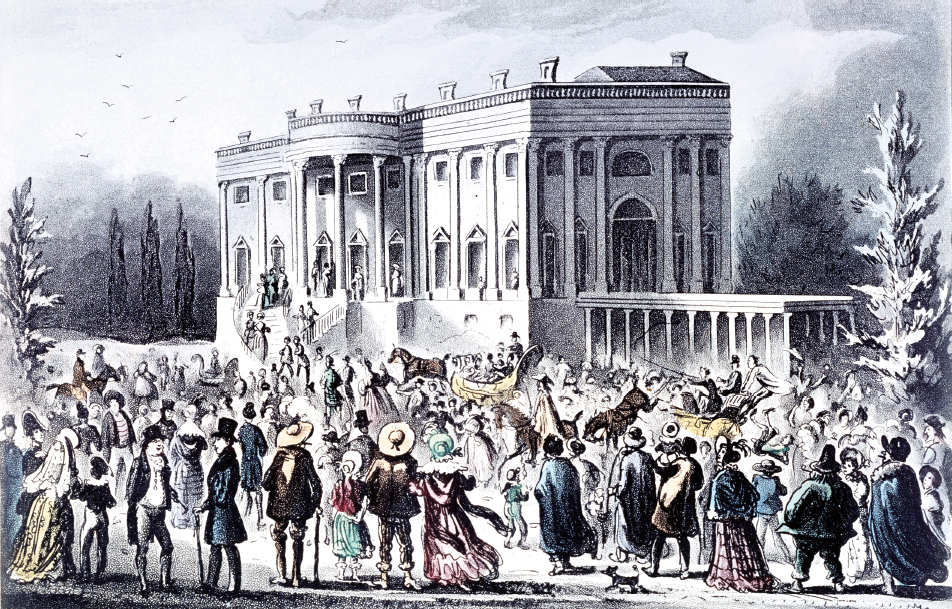Exploring American Histories: Printed Page 277
Exploring American Histories, Value Edition: Printed Page 236
A Democratic Spirit?
On March 4, 1829, crowds of ordinary citizens came to see their hero’s inauguration. Jackson’s wife Rachel had died less than three months earlier, leaving her husband devastated. Now Jackson, dressed in a plain black suit, walked alone to the Capitol as vast throngs of supporters waved and cheered. Wealthy planters were jammed shoulder to shoulder with frontier farmers and working men and women. Local African Americans also turned out for the spectacle. A somber Jackson read a brief inaugural address, took the oath of office, and then rode his horse through the crowds to the White House.

The size and enthusiasm of the crowds soon shattered the decorum of the inauguration. Author Margaret Bayard Smith reported mobs “scrambling, fighting, [and] romping” through the White House reception. Jackson was nearly crushed to death by “rabble” eager to shake his hand. Tubs of punch laced with rum, brandy, and champagne were finally placed on the lawn to draw the crowds outdoors.
Nonetheless, Jackson and his supporters viewed the event as a symbol of a new democratic spirit. Others were less optimistic. Bayard Smith warned against putting too much faith in “the people,” who “have been found in all ages and countries where they get power in their hands, that of all tyrants, they are the most ferocious, cruel, and despotic.” She and other conservative political leaders also saw echoes of the French Revolution in the unruly behavior of the masses. Supreme Court justice Joseph Story, too, feared “the reign of King ‘Mob.’”
Tensions between the president and the capital’s traditional leaders intensified in the first months of his administration. Jackson’s appointment of Tennessee senator John Eaton as secretary of war added to the rancor. Eaton had had an affair with a woman thought to be of questionable character and later married her. When Jackson announced his plans to appoint Eaton to his cabinet, congressional leaders urged him to reconsider. When the president appointed Eaton anyway, the wives of Washington’s leading politicians snubbed Mrs. Eaton and refused to accept her social calls. This time Jackson was outmaneuvered in what became known as the Petticoat Affair, and Eaton was eventually forced from office.
From the days of Dolley Madison, political wives had wielded considerable influence in Washington. In 1831 they pressured Eaton to resign. But the Petticoat Affair also led Jackson’s entire cabinet to resign, after which his legislative agenda stalled in Congress and National Republicans regained the momentum lost after Adams’s defeat. The Eaton appointment had reinforced concerns that the president used his authority to reward his friends. So, too, did his reliance on an informal group of advisers, known as the Kitchen Cabinet, rather than his official cabinet. While his administration opened up government posts to a wider range of individuals, ensuring more democratic access, he often selected appointees based on personal ties. The resulting spoils system—introduced by Jackson and continued by future administrations—assigned federal posts as gifts for partisan loyalty rather than as jobs that required experience or expertise.